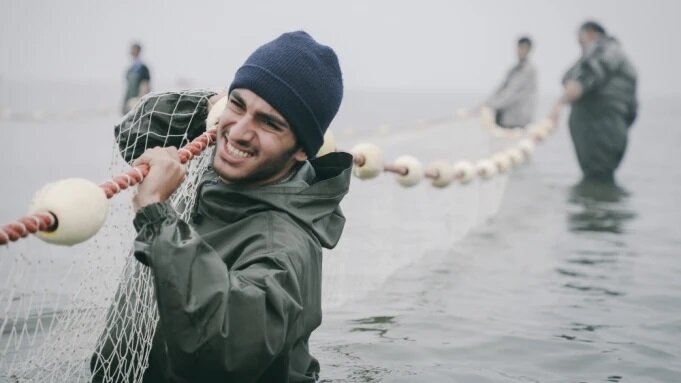“Empty Nets” wins award at Karlovy Vary festival

TEHRAN –“Empty Nets”, an Iran-Germany co-production directed by Iranian filmmaker Behrouz Karamizadeh, won the special jury award of the 57th Karlovy Vary International Film Festival in Czech, the organizers announced on Saturday.
The award-winning film also received a cash prize of $15,000, which will be equally divided between the director and producer of the film.
“Empty Nets” tells the story of Amir and Narges, who have found genuine love in their coastal hometown near the Caspian Sea. However, in modern Iran, it is difficult to build a future as a couple, and they have to hide their love from society.
To gain the approval of Narges' wealthy family and provide a suitable dowry, Amir requires a significant amount of money urgently. Faced with limited options, Amir secures a job at a nearby fishery, embarking on a perilous yet profitable venture involving the illicit smuggling of black market caviar.
Amir's moral beliefs are jeopardized by the unlawful criminal world, while Narges endeavors to buy time and hinder the predetermined marriage arranged by her parents.
Bulgaria-Germany co-production “Blaga’s Lessons” by Stephan Komandarev received the festival’s Grand Prix and Crystal Globe. The film also brought Eli Skorcheva the best actress award.
Iranian-British director Babak Jalali was picked as best director for “Fremont”.
Herbert Nordrum from Norway received best actor award for his role in for her role in “The Hypnosis” by Ernst De Geer.
This edition of the festival also celebrated the new generation of independent Iranian filmmakers in a special section entitled “Another Birth. Iranian Cinema, Here and Now”.
Nine films offering “an insightful testimony of the burning creativity of Iran’s artists in face of the challenging reality” was screened in this section.
The selection included melancholic dramas, comedies, war movies, sci-fi films and movies about love, which have been made over the past four years.
“This cinema should not be read with the regular tools we use to decode most films,” said the retrospective’s curator Lorenzo Esposito.
“This cinema compels us to reinvent our tools, to reinvent how we see and interpret film, in order to engage with the intentions of these filmmakers,” he added.
“As the title of a poetry collection by Forugh Farrokhzad read, ‘We present here and now another birth of Iranian cinema’,” he asserted.
The directorial debut “The Skin” by twin brothers Bahram and Bahman Ark was a highlight of the lineup.
In this film, a young man named Araz seeks to marry his true love, but his mother, a sorceress, has cast a spell to keep her son with her. The closer he gets to his beloved, the weaker his mother becomes. He seeks to break the spell with the help of an itinerant musician and a mysterious recluse with access to the spirit world.
Mohammadreza Shayannejad’s debut film “Trip to the Moon” was also screened.
Zoya’s voice is placed in a bottle. Something both ethereal and mechanical is shimmering in the air. Farid plans to construct a device, which would enable him to record this invisible movement. Reality breaks up into tiny fragments; voices from the past and future start to materialize. Zoya sets off on a trip to the Moon. An electrifying film generated from brilliant waves, streaking through the air with tempestuous force.
The selection also featured “Black and White River” by Farzin Mohammadi, “Creation between Two Surfaces” by Hossein Rajabian, “Dream’s Gate” by Negin Ahmadi, “K9” by Vahid Vakilifar, “Locust” by Faezeh Azizkhani, “No End” by Nader Saeivar and “Zapata” by Danesh Eghbashavi.
In addition, Iranian director Karim Lakzadeh’s movie “Dark Matter” was screened in the Proxima Competition, but failed to win an award.
Photo: A scene from “Empty Nets” by Behrouz Karamizadeh
ABU/
